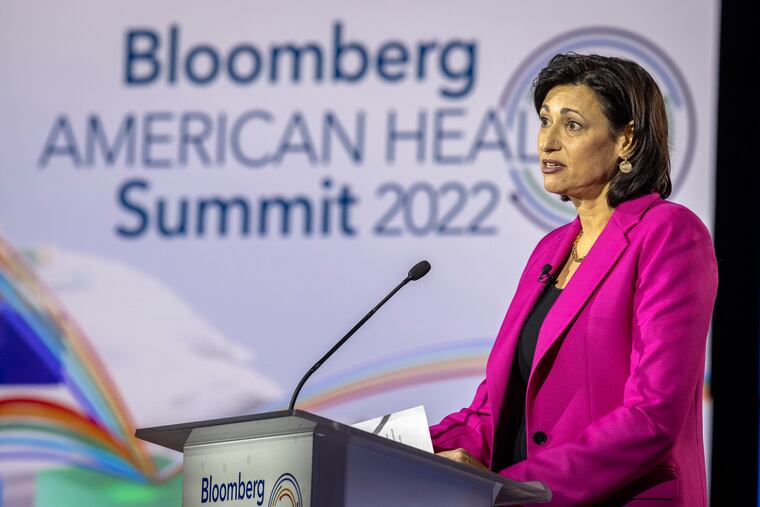CDC director is urging people to wear masks indoors and on public transit, raising alarms about the ‘tridemic’
Rochelle Walensky spoke at a health summit in Philadelphia on Tuesday.

Federal and local health departments must invest in better data tracking technology to quickly respond to viral outbreaks, such as COVID-19 and the ”tridemic” of influenza, RSV, and COVID currently straining hospitals, CDC Director Rochelle Walensky said in Philadelphia on Tuesday.
Walensky’s remarks at the Bloomberg American Health Summit, held at Loews Hotel Philadelphia, came a day after she urged Americans during a CDC news conference to be proactive in protecting themselves and others by wearing a mask indoors and on public transportation.
She also recommended that people see a doctor if they have symptoms and that they get vaccinated.
“The past several years have certainly not been easy, and now we face another surge of illness, another moment of overstretched capacity, and one of tragic and often preventable sadness,” Walensky said during a CDC briefing Monday.
The CDC has recorded at least 8.7 million cases of flu, including 78,000 hospitalizations and 4,500 deaths, since October, the Washington Post reported.
Children’s hospitals have been flooded with cases of RSV, a flulike virus that can cause severe respiratory problems among very young children and those with underlying health conditions.
“Our hospital is filling up with young babies that are struggling to breathe,” James Reingold, chair of the department of emergency medicine at St. Christopher’s Hospital for Children in Philadelphia, told The Inquirer in early November.
» READ MORE: As respiratory virus cases surge among kids in Philly region, children’s hospitals filling up
Looking ahead, even as cases rise this season
COVID cases and hospitalizations are also rising in Pennsylvania and New Jersey but remain within the range the region has seen over the last two months.
On Tuesday, Walensky focused on what the CDC and public health agencies can do to be better prepared for future outbreaks — namely, modernizing data-gathering operations.
The pandemic exposed how insufficient the CDC’s system of gathering health data was, Walensky said, noting at the beginning of the pandemic the agency did not have the ability to track COVID test results.
The CDC has little power to compel local or state health agencies to share data. Information can arrive incomplete and months or even years late — too late to be useful for policymaking.
“The challenges of the COVID-19 pandemic made us acutely aware of the urgent need to create public health culture that is nimble,” Walensky said.
Health agencies need to do more than just speed up data delivery, she said. Each municipality, county, and state has a different system for gathering and sharing data, making it difficult to make comparisons and standardize data. The CDC has struggled to gather standardized data about firearms-related injuries and deaths, diabetes, and hypertension, among other health concerns, Walensky said.
“Some are still working on 1980s fax machines,” she said.
Walensky promoted a bill in Congress that would create a data center that local health entities could enter information into, ensuring standardization. She said efforts to improve data sharing have led to more than 20,000 health-care facilities nationwide participating in an automated program that aggregates patient data nearly in real time.
Still, those participating represent just 22% of hospitals registered for Medicaid and Medicare services and 9% of rural health providers.
Other conference speakers included Pennsylvania’s incoming governor, Josh Shapiro, who discussed his commitment to working on public health issues such as violence, the environment, and drug addiction. Philadelphia has one of the worst big-city overdose crises in the country: A record 1,276 people died of overdoses here in 2021.
After his public remarks, Shapiro told The Inquirer that he remains opposed to efforts to open a place in Philadelphia where people with addiction can use drugs under medical supervision. The federal government on Monday asked for more time to respond to a lawsuit over a proposed supervised injection site in the city.
Staff writer Aubrey Whelan and the Washington Post contributed to this article.